- Home
- Peter Benchley
Beast Page 15
Beast Read online
Page 15
Still, it was eerie to be alone on the ocean like this. The boat was almost fifty feet long, and down below it seemed as big as a house, but up here—with the waves on either side and the horizon stretching forever and the sky completely empty—it felt as tiny as a bug on a carpet.
Her father stuck his head up through the hatch. “How’s it going, Muffin?”
She had begged him to call her Katherine. Just for this trip. Or Kathy. Anything but Muffin.
“Fine, Daddy.”
“How’s she doing, Tim?”
Be nice, she prayed. Don’t be a typical shithead brother.
“Pretty good …” Tim said.
Thank you …
“… only a little absentminded now and then.”
Shithead!
“We just raised Bermuda on the radar … edge of the fifty-mile ring.”
“Great!” Katherine said, hoping that was the right thing to say.
“Sure is. Means we can cruise right along all night, and if we’re lucky hit the channel just after daybreak. We don’t want to try it in the dark.”
“God, no,” said Tim. “Remember last year?”
“Don’t remind me.”
Of course, Katherine thought. Last year. When I wasn’t there. That’s when the excitement always happens: when I’m not there.
Her father started to pull his head back, then stopped and said, “Funny thing … Bermuda Harbour Radio’s broadcasting a Notice to Mariners about some animal that’s attacking boats.”
“A whale?” Katherine said. “Maybe it’s sick.”
“I don’t know, I think they’re just trying to juice up tourism, play on the Bermuda Triangle thing. Anyway, no point taking chances. Put your lifeline on whenever you move around.”
“Daddy, it’s not even rough.”
“I know, Muffin, but better safe than sorry.” He smiled. “I promised your mother I’d take extra-special care of you.” He gestured to Tim, then backed down into the cabin.
Tim sat up, reached over to Katherine’s life jacket, unwrapped her jury-rigged lifeline and snapped it into the steel ring on the wheel post.
“What about yours?” she said. “You’re not even wearing a life jacket.”
“I’ve done this race three times,” Tim said. “I think I know how to walk around a boat.”
“So do I!”
“Argue with Dad, then, not me. I’m just following orders.” Tim smiled at her and lay back on the cushions.
She flexed her fingers to quell the cramps, and shifted her weight to try to ease the strain on her arms and shoulders. She wasn’t wearing a watch, had no idea how much longer she had to wrestle with this stupid wheel. Not too much longer, she hoped, or she’d have to ask Tim to take over for her, and he’d make some crack that would put her down—nothing mean, really, just some dumb macho remark.
She wasn’t a quitter. She had pleaded to come on this trip, and she was determined to do her share, including standing watches. She knew that her brothers had argued against her coming along, and that if her mother hadn’t sat her father down and had a heart-to-heart talk with him about fairness and equality and all the rest, she’d be back in Far Hills teaching tennis to ten-year-olds. She owed it to her mother, and to herself, to prove that she could be an asset, not a liability.
But she couldn’t wait for it to be over, to get to Bermuda and spend a couple of days lying on the beach and tooling around on a motorbike, while her father and the others talked sailing over drinks at the Yacht Club—no, the Dinghy Club, they called it here. Cute.
Then she’d fly home, that had been the deal. Thank God.
She couldn’t fathom the mystique of big-boat sailing, although she feigned enthusiasm and tried her best to master obscure terms like “klew cringle” and “running backstay.”
She enjoyed day sailing in small boats at the shore. It was fun to spend a couple of hours on the water, racing against friends, yahooing around, sometimes even capsizing—but then going home to a hot shower and decent food and a good night’s sleep.
But this: This was a marathon of boredom, discomfort and fatigue. Nobody slept more than four or five hours a day. Nobody bathed. She had tried to take a shower once, but had fallen down twice and cut her head on the soap dish, so had resigned herself to sponging off whatever she could reach whenever she could. Everything felt soggy. Everything stank of salt and mold. The entire belowdecks smelled like a giant wet sneaker. You needed a graduate degree in engineering to operate the toilets. Both of them clogged at least once a day, and blame inevitably fell on Katherine and the only other female on board, David’s stuck-up girlfriend Evan … as if girls somehow conspired against marine plumbing. Katherine had been appointed “assistant chief cook and bottle washer,” which turned out to be a bad joke because how can you cook anything decent when the whole boat is always tilted at an angle so you can barely stand up? All she had been able to do was keep hot coffee and soup available day and night, and sandwich makings in a Tupperware bowl in the sink for whoever wanted something more.
She wouldn’t have minded any of the bad stuff if there had been enough good stuff to compensate, but as far as she could tell, ocean racing—in good weather, at least— consisted of a lot of talk, a lot of sitting around, and about half an hour a day of frantic action, during which her contribution was to stay out of the way.
Katherine had concluded that it must all have something to do with male bonding, and while she was glad to have seen it firsthand, she would be perfectly happy henceforth to hear about it and to smile politely at her brothers’ tales of heroics on the high seas.
Her arms and shoulders were shrieking now; she had no choice; she’d have to turn the wheel over to Tim.
But then suddenly—blessedly—the watch changed. Her father and her uncle Lou came up through the hatch to relieve her and Tim, and Lou’s two boys went forward to replace David and Peter.
“Good job, sweetheart,” her father said as he slid behind the wheel. “Right on course.”
“You have any idea how we’re doing?” Tim asked.
“Hard to tell. I think we’ve got a shot at second or third in our class. Lot of boats on the radar, but I can’t tell what they are.”
Katherine unsnapped her lifeline from the steel ring and went below. She took off her life jacket and tossed it on her bunk. Tim squeezed by her and went forward into the fo’c’sle and flung himself on one of the bunks. Didn’t even take his shoes off. No wonder the place smelled like a gym.
Katherine decided to have a cup of soup and read for a while, until she fell asleep. Nothing else to do.
She heard her father shout, “Ready about!” Footsteps hammered on the fiberglass overhead. She gripped the railing of the top bunk, where Evan was asleep and snoring like a chain saw, and braced herself.
“Hard alee!” called her father, and the boat righted itself and hung there for a second and then, as the boom came around and the sail caught the wind with a whump!, it heeled to port. There was a clatter of crockery in the sink, as dirty cups shifted and tumbled over one another.
She should wash the cups. That was her job. But it was Evan’s job, too, and Evan hadn’t bothered, she’d just gone to sleep. To heck with it; she’d wash them later. She rinsed one cup and poured some soup for herself and drank it down.
On her way back to her bunk, she stopped and looked at the radar screen. It glowed like a green video game. A yellow line swept clockwise in a circle, flashing golden blips that she knew were other boats. At the top of the screen was a ragged smear.
Hello, Bermuda, she thought. Save some sun for me. And maybe, while you’re at it, a good-looking lifeguard. One who hates sailboats.
She was glad she had looked—it made her feel less alone.
She lay down in her bunk and turned on the little reading light over her head and picked up her copy of Anne Rice’s The Mummy—her mother’s choice for her, and perfect for a trip like this: romantic, scary, long enough to last several days and eas
y to pick up and put down without losing the plot. She found her place.
Ramses had brought Cleopatra back to life, and Cleopatra was making out with every man she met and then killing him, and …
She had to go to the John. She sighed and got up and walked aft, past the chart table, and opened the door to the head. The smell assaulted her, worse than the public Johns in Penn Station. She didn’t have to look, but she did, and sure enough, it was clogged. She stepped on the flush pedal and gave the pump handle one try, but the sound-—a strangled gurgle—warned her against trying again.
She went forward to the other head. There was a piece of masking tape on the door, with OUT OF ORDER on it in marking pen.
Swell.
She went back to her bunk and opened the drawer beneath it and fetched her emergency John: an empty quart mayonnaise jar.
Then she returned to the after head and held her breath as she peed in the jar, thinking only: Please let tomorrow come, let me go to sleep and not wake up till we’re at the dock.
When she had finished, she screwed the top tight and started up through the hatch.
“Life jacket,” her father said.
“I’m just …” She showed him the jar.
“Both now?”
“Uh-huh. Again.”
“Lord … well, we’ll fix ‘em when we get in.”
Uncle Lou said, with a little snicker, “Ladies …”
“Uncle Lou …” Catherine said. “I wasn’t great at biology, but I think men go to the John, too … sometimes.”
“I stand corrected,” Uncle Lou said, smiling.
“Here,” said her father, and he held his hand out to take the jar.
“I’ll do it,” she said.
“Muffin …”
“I’ll do it.”
“Then put your life jacket on.”
“Daddy … Oh, all right.” She backed down the ladder and went to her bunk and got her life jacket. She was angry, embarrassed, annoyed. Nobody else was wearing a life jacket, and they were running around the deck like monkeys. She wanted to take three steps to empty a jar overboard, and he was making her dress up like an astronaut.
She put the life jacket on and thought, Who’s being dumb now? Why don’t you let him throw it over for you? Because. Because what? Because it’s … private. Stupid. He used to change your diapers. Never mind, too late now.
She went up through the hatch and stepped around the wheel and started forward on the leeward side of the boat. The sun was low in the western sky, low enough so that the ocean swells blocked it, and here, further shaded by the big sail, the light was as dim as evening.
“Snap in,” her father said.
“Yes, sir.” She snapped the lifeline onto the quarter-inch cable connecting two stanchions.
“I know you find this hard to believe, but I’m not being a pain just to amuse myself.”
“No, sir.” She knew she sounded petulant, but she couldn’t help it.
She unscrewed the cap of the jar and, her knees braced against a stanchion, leaned out to empty the jar. The jar was big for her hand, and as she upended it, it slipped. Reflexively, she reached for it with her other hand, and she dropped the cap, and she lunged to grab that, too, and then suddenly there was a little stutter in the wind, a puff that pushed the boat farther over. And then suddenly there was nothing supporting her legs, and because most of her weight was overboard she lost her balance and fell, somersaulting.
In that split second, she knew that the lifeline would stop her and swing her back into the boat, and she tensed and raised her hands to her head. There was a jolt as the lifeline caught. She heard herself screaming, and something else, a weird tearing noise, and then, when she should have felt herself slamming against the side of the boat, she felt … water.
, She was underwater, upside down, and then the life jacket righted her and she bobbed to the surface. She couldn’t see—her hair was in her eyes. She wiped it away, and still she couldn’t see anything but water, great undulating swells of blue-black water.
This couldn’t be! What had happened? She looked down at her life jacket, and there was a jagged hole where the lifeline had torn away.
She could hear her father shouting, and other people too, a jumble of words, so she used her hands to turn herself around, and there, silhouetted against the setting sun, was the top of the mast, heading away from her, the sail flapping, the voices growing fainter.
A swell rose beneath her and carried her high on its crest, and now she could see all of the mast and even the top of the cabin. She screamed, but she felt—no, she knew—that the wind was snatching her words away and flinging them eastward into the night.
The swell passed her, and she slid into the trough, and now she saw none of the boat, not even the top of the mast.
She felt something in the water that encased her, a pulsing, very faint, but definite.
The engine. They’d turned on the engine. Good. Now they could maneuver, and find her fast. Fast. Before night fell.
Another swell came, and from its crest she saw the mast again, looking farther away, and all the lights were on it—masthead light, running lights, anchor lights—so she would be able to see it.
She screamed again and waved her arms, but they couldn’t hear her now. Of course they couldn’t, not with the engine on.
Why did they keep moving away from her? Why didn’t they turn around?
Then the boat did turn, its bow slewing to the right; it began to circle back to her. Good. They’d find her now.
The swell dropped her into a trough, where she could see nothing but water.
If she couldn’t see them, how could they see her? They stuck up fifty feet. How far did she stick up? Two feet?
Save your strength, she thought. Don’t scream, don’t flail around till you’re on the top of a wave, where they can see you.
A swell raised her up, and she saw the boat, almost all of it … but it was moving away from her, in a different direction! She screamed.
As that swell dropped her down again, she turned her head to the west. The sun was gone, leaving only an orange glow on the horizon, and pink-rimmed clouds against the darkening sky. Overhead she could see stars.
It would be dark soon. They had to find her … had to … or …
Don’t even think about it.
God, it was cold! How could she be so cold so soon? She’d only been in the water a few minutes, but her arms and legs were trembling, and her throat and jaw were quivering so badly that she had trouble breathing.
It floated in the cool middle layer of the ocean water, unthreatened, unperturbed, drifting.
It had fed recently, gorging itself, so for now it felt no urgency to hunt.
It was existing, merely existing.
And then, from somewhere far away, it felt the thrum of a pulse, faint waves that coursed through the water and tapped at its flesh.
Curious rather than concerned, it fluttered its tail fins and slowly rose.
Had it encountered warmer water, it would have stopped, for comfort was its only imperative. But the cool layer continued, and so it allowed itself to rise.
It sensed light now, and the pulse was nearer, and there was something else, something apart from the pulse, disturbing the water above.
Something alive.
A swell lifted Katherine, and when she reached the crest she saw the boat, the whole boat—nearby!—a dark shape against the twilight sky, with the white and red and green lights shining from the mast.
She screamed and waved her arms, then slid off the crest and back into the trough again.
They hadn’t seen her, hadn’t heard her. Why? They were so close! She had heard them, had heard the engine and even maybe a voice.
She was downwind, that was why. Sound was carrying from them to her but not from her to them.
Dark. It was dark, almost night. And cold. And deep. How deep? Forever deep.
Now, at last, terror struck her, a true gut primal fe
ar that flooded through her veins and tore at every nerve ending.
Her father had talked of monsters, and now she knew they were going to get her. Nightmare images flashed into her mind, images she hadn’t had in years, since she was six or eight, all the beasts that had lived under her bed and in the closet and in the rustling trees outside her window. Always her mother had come into her room and comforted her, told her everything was fine, the monsters were make-believe.
But nobody rushed to comfort her now. Make-believe was real.
She felt so alone, a loneliness she had never known existed, as if she were the only living thing on the planet.
Thoughts tumbled over one another in her head: Why had she insisted on coming on this trip? Why hadn’t she let her father empty the jar for her? Why, why, why?
She tried to pray, but all she could think of was, Now I lay me down to sleep… .
She was going to die.
No!
She screamed again—not on purpose, not to be noticed, but the scream of a living being protesting death.
She was carried to the top of another crest, and saw that the boat was there, even closer, but something was different. It wasn’t moving; it had stopped. She could hear no engine noise.
As she slid into the trough, she heard a voice: her father, talking through a loud-hailer.
“Katherine, can you hear me? We can’t see you, but we’ve turned off the engine, turned off everything, so we’ll be able to hear you. If you can hear me, as soon as I stop, you scream, honey, scream for all you’re worth, okay? … Now scream!”
She thought: He called me Katherine.
She screamed.
It was one hundred feet below the surface. It hovered, letting its senses gather information.
The pulse from above had stopped, but there was disturbance on the surface, and something small, moving.
The living thing. Slowly, it rose.
“I hear you, Katherine! Again! Again!”
She screamed again, her voice scratchy, not as loud, but she summoned all her strength and forced herself to scream again, and again.

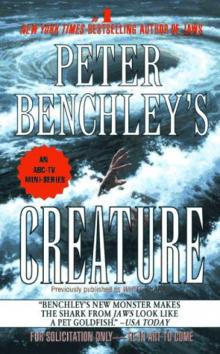 Peter Benchley's Creature
Peter Benchley's Creature The Island
The Island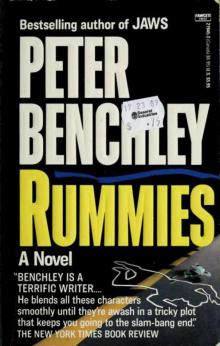 Rummies
Rummies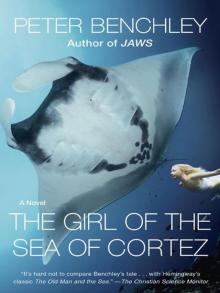 The Girl of the Sea of Cortez: A Novel
The Girl of the Sea of Cortez: A Novel Time and a Ticket
Time and a Ticket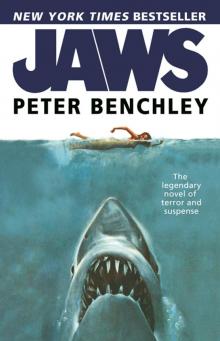 Jaws
Jaws The Deep
The Deep Q Clearance
Q Clearance Shark Trouble: True Stories and Lessons About the Sea
Shark Trouble: True Stories and Lessons About the Sea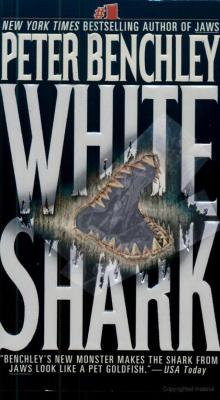 White Shark
White Shark Shark Trouble
Shark Trouble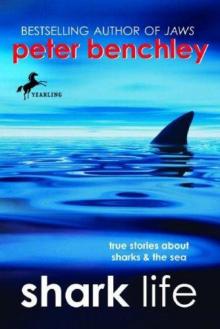 Shark Life: True Stories About Sharks & the Sea
Shark Life: True Stories About Sharks & the Sea